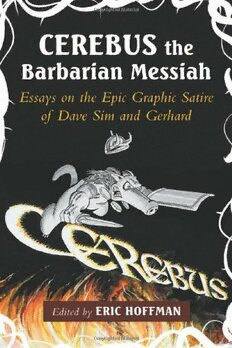
Cerebus the barbarian messiah : essays on the epic graphic satire of Dave Sim and Gerhard PDF
Preview Cerebus the barbarian messiah : essays on the epic graphic satire of Dave Sim and Gerhard
Cerebus the Barbarian Messiah This page intentionally left blank Cerebus the Barbarian Messiah Essays on the Epic Graphic Satire of Dave Sim and Gerhard Edited by E H RIC OFFMAN McFarland & Company, Inc., Publishers Jefferson, North Carolina, and London LIBRARYOFCONGRESSCATALOGUING-IN-PUBLICATIONDATA Cerebus the barbarian messiah : essays on the epic graphic satire of Dave Sim and Gerhard / edited by Eric Hoffman. p. cm. Includes bibliographical references and index. ISBN 978-0-7864-6889-8 softcover : acid free paper 1. Sim, Dave, 1956– Cerebus 2. Gerhard, 1959– Cerebus 3. Comic books, strips, etc.—Canada—History and criticism. I. Hoffman, Eric, 1976– PN6734.C47C47 2012 741.5'971—dc23 2012007782 BRITISHLIBRARYCATALOGUINGDATAAREAVAILABLE © 2012 Eric Hoffman. All rights reserved No part of this book may be reproduced or transmitted in any form or by any means, electronic or mechanical, including photocopying or recording, or by any information storage and retrieval system, without permission in writing from the publisher. Reprint with corrections Cover art by Dave Sim, colored dyes and black ink on illustration board, 111⁄2" × 17", 2005 (from the collection of Darren O’Shaughnessy) Manufactured in the United States of America McFarland & Company, Inc., Publishers Box 611, Jefferson, North Carolina 28640 www.mcfarlandpub.com Acknowledgments I would like to thank each of the contributors for their time and talent in helping make this volume a reality. Utmost appreciation goes to Dave Sim and to Gerhard, for their immense contribution to the art of the comics medium. Together, they have expanded the medium’s visual and verbal lexicon. I sincerely hope that this volume is wor- thy of its subjects. This page intentionally left blank Table of Contents Acknowledgments v Preface 1 Introduction: Alone, Unmourned and Unloved Eric Hoffman 5 Part One: A Map of Estarcion Growing Complexity; or, the Cerebus Effect Sebastian Domsch 65 Audacious Tenacity, Tenacious Audacity: Cerebus’ Grand (and Changing) Narrative Strategies Eric Hoffman 77 Part Two: Ignore It, It’s Just Another Reality “Does This Seem Right to You?” Stories Within Cerebus David Groenewegen 97 Aardvarkian Intertexts and True Stories Dominick Grace 103 “Why Certainly Dear Boy...” Incorporating Oscar Wilde into the Aardvark’s World Gregory John Fink 118 Part Three: Becoming Synonymous with Something Indescribable Seeing Sound C.W. Marshall 127 Negative Space and Guttural Noise: Gerhard’s Psychological Reads Sabin Calvert 148 Part Four: Mind Games Testing the Limits of Genre/Gender Dominick Grace 163 vii viii Table of Contents Anti-Feminist Aardvark? Gender, Subjectivity and Authorship Isaac J. Mayeux 175 The Aardvark and the Beautiful Women: Male Sexuality and Gender Politics Mario N. Castro 190 Part Five: Ye Booke of Sim YHWH’s Story, or, How to Laugh While Reading “Chasing YHWH” and Still Have Enough Stamina for The Last Day Edward M. Komara 199 Appendix: An Introduction to the Cerebus “Phonebooks” Lenny Cooper 217 Bibliography 221 About the Contributors 225 Index 227 Preface In 1977, a struggling Canadian comics artist named Dave Sim self-published the first issue of Cerebus the Aardvark. A Conanthe Barbariansatire utilizing the Howard the Duck setting of a funny animal trapped in a human world trope, at first Cerebus was largely a story of a foul-tempered, sword-wielding aardvark, traveling the “northern territories” of the imaginary world of Estarcion, seeking fortune and strong drink. Sim’s bi-monthly black and white comic was one of the few success stories of the comic industry’s direct market, then a relatively new comics distribution phenomenon. Within a decade, Sim single-hand- edly helped revolutionize the comics medium by showing other comics artists they too could forgo the usual route of publication by way of a major publisher. In so doing, Sim inspired such successes as Teenage Mutant Ninja Turtles and Bone, along with dozens of other self-published black and white comics that began appearing in subsequent years and decades. The reasons for Sim’s success with Cerebus the Aardvark (later just Cerebus)are man- ifold: its humor, its artful design, Sim’s knowledgeable, tongue-in-cheek satire of the comics medium, and perhaps most importantly, its predictable bi-monthly (later monthly) pub- lishing schedule. As critic R. Fiore observes, “Sim’s success was the result of a fan boy’s understanding of what made a comic successful: a regular publishing schedule and the same ingredients as what the majors had to offer: superheroes, buxom women, and, at the time, a funny animal and swords and sorcery” (Fiore October/November 2004, 105). Over the course of 26 years, from December 1977 to March 2004, Sim, and later collaborator Gerhard, produced over 6,000 pages of narrative, totaling 300 separate issues subsequently collected into sixteen trade paperbacks. When he set out to write Cerebus, Sim intended to break every rule of the medium. The title of this book suggests this unique aspect of Cerebus; namely, the ability to transform, transgress and violate. As the essays collected here demonstrate, with Cerebus, Sim meant to upset multiple boundaries, be they aesthetic, sexual, political or religious. Comics in the late 1970s were staid, predictable stuff. The Marvel revolution of the late 1960s had long since devolved into cookie-cutter homogeneity, and unchallenging, for- mulaic work cluttered comics racks. Cerebus became the outlet for Sim’s dissatisfaction with the medium he loved. As the series progressed so too did its satirical reach. Sim began incorporating other comics characters, notably through the agency of The Roach, a schiz- ophrenic whose sundry personalities are comprised of parodies of various popular-at-the- time superheroes, including Moon Knight, Wolverine, Captain America and The Sandman, among others. Yet Sim also satirized non-comics characters, including Michael Moorcock’s Elric, Hal Foster’s Prince Valiant, and even Groucho (and later Chico) Marx. His satires 1
